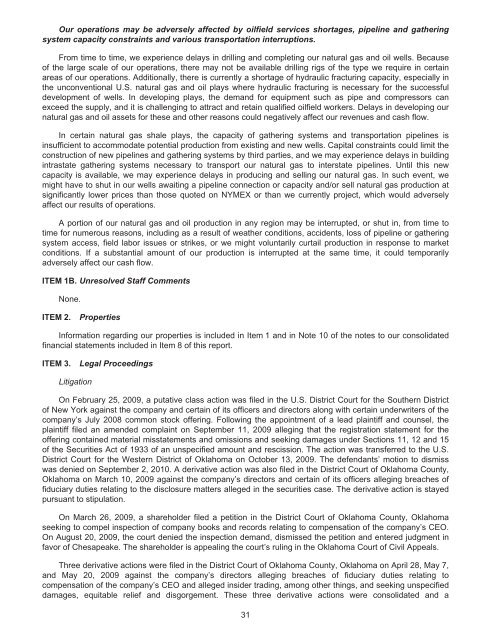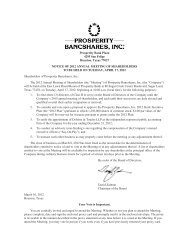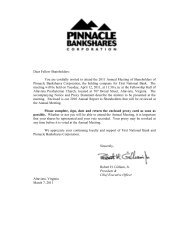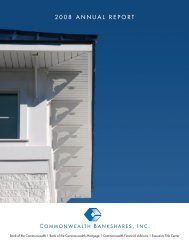6 5 - RR DONNELLEY FINANCIAL - External Home Login
6 5 - RR DONNELLEY FINANCIAL - External Home Login
6 5 - RR DONNELLEY FINANCIAL - External Home Login
You also want an ePaper? Increase the reach of your titles
YUMPU automatically turns print PDFs into web optimized ePapers that Google loves.
Our operations may be adversely affected by oilfield services shortages, pipeline and gathering<br />
system capacity constraints and various transportation interruptions.<br />
From time to time, we experience delays in drilling and completing our natural gas and oil wells. Because<br />
of the large scale of our operations, there may not be available drilling rigs of the type we require in certain<br />
areas of our operations. Additionally, there is currently a shortage of hydraulic fracturing capacity, especially in<br />
the unconventional U.S. natural gas and oil plays where hydraulic fracturing is necessary for the successful<br />
development of wells. In developing plays, the demand for equipment such as pipe and compressors can<br />
exceed the supply, and it is challenging to attract and retain qualified oilfield workers. Delays in developing our<br />
natural gas and oil assets for these and other reasons could negatively affect our revenues and cash flow.<br />
In certain natural gas shale plays, the capacity of gathering systems and transportation pipelines is<br />
insufficient to accommodate potential production from existing and new wells. Capital constraints could limit the<br />
construction of new pipelines and gathering systems by third parties, and we may experience delays in building<br />
intrastate gathering systems necessary to transport our natural gas to interstate pipelines. Until this new<br />
capacity is available, we may experience delays in producing and selling our natural gas. In such event, we<br />
might have to shut in our wells awaiting a pipeline connection or capacity and/or sell natural gas production at<br />
significantly lower prices than those quoted on NYMEX or than we currently project, which would adversely<br />
affect our results of operations.<br />
A portion of our natural gas and oil production in any region may be interrupted, or shut in, from time to<br />
time for numerous reasons, including as a result of weather conditions, accidents, loss of pipeline or gathering<br />
system access, field labor issues or strikes, or we might voluntarily curtail production in response to market<br />
conditions. If a substantial amount of our production is interrupted at the same time, it could temporarily<br />
adversely affect our cash flow.<br />
ITEM 1B. Unresolved Staff Comments<br />
None.<br />
ITEM 2. Properties<br />
Information regarding our properties is included in Item 1 and in Note 10 of the notes to our consolidated<br />
financial statements included in Item 8 of this report.<br />
ITEM 3. Legal Proceedings<br />
Litigation<br />
On February 25, 2009, a putative class action was filed in the U.S. District Court for the Southern District<br />
of New York against the company and certain of its officers and directors along with certain underwriters of the<br />
company’s July 2008 common stock offering. Following the appointment of a lead plaintiff and counsel, the<br />
plaintiff filed an amended complaint on September 11, 2009 alleging that the registration statement for the<br />
offering contained material misstatements and omissions and seeking damages under Sections 11, 12 and 15<br />
of the Securities Act of 1933 of an unspecified amount and rescission. The action was transferred to the U.S.<br />
District Court for the Western District of Oklahoma on October 13, 2009. The defendants’ motion to dismiss<br />
was denied on September 2, 2010. A derivative action was also filed in the District Court of Oklahoma County,<br />
Oklahoma on March 10, 2009 against the company’s directors and certain of its officers alleging breaches of<br />
fiduciary duties relating to the disclosure matters alleged in the securities case. The derivative action is stayed<br />
pursuant to stipulation.<br />
On March 26, 2009, a shareholder filed a petition in the District Court of Oklahoma County, Oklahoma<br />
seeking to compel inspection of company books and records relating to compensation of the company’s CEO.<br />
On August 20, 2009, the court denied the inspection demand, dismissed the petition and entered judgment in<br />
favor of Chesapeake. The shareholder is appealing the court’s ruling in the Oklahoma Court of Civil Appeals.<br />
Three derivative actions were filed in the District Court of Oklahoma County, Oklahoma on April 28, May 7,<br />
and May 20, 2009 against the company’s directors alleging breaches of fiduciary duties relating to<br />
compensation of the company’s CEO and alleged insider trading, among other things, and seeking unspecified<br />
damages, equitable relief and disgorgement. These three derivative actions were consolidated and a<br />
31











